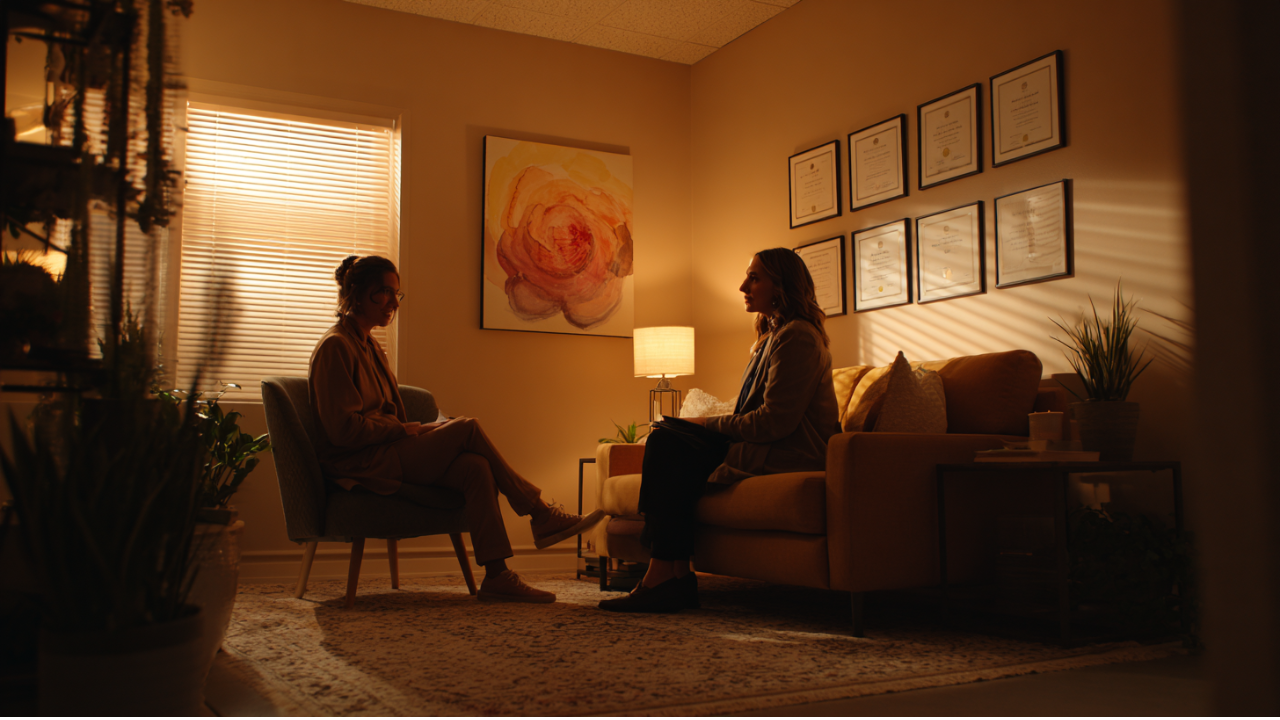Sex therapy vs traditional counseling: which works

When facing intimate challenges, many people wonder whether they should seek specialized sex therapy or traditional counseling. Both approaches offer valuable benefits, but understanding their differences can help you make the most informed decision for your specific needs. Professional counseling services for sexual health provide targeted solutions that address the unique complexities of intimate wellness.
Understanding the fundamental differences
What is sex therapy?
Sex therapy represents a specialized form of psychotherapy designed specifically to address sexual dysfunctions, intimacy issues, and relationship challenges related to sexual health. Licensed sex therapists receive extensive training in human sexuality, sexual anatomy, and evidence-based treatment methods for sexual concerns.
Unlike general therapy, sex therapy focuses exclusively on sexual functioning, desire, communication about intimacy, and the psychological factors that influence sexual satisfaction. This specialized approach allows therapists to address sexual health with depth and expertise that general counseling may not provide.
Traditional counseling approaches
Traditional counseling encompasses various therapeutic modalities that address mental health, relationship issues, and life challenges. While traditional therapists may touch on sexual topics, their training typically covers broader psychological concerns rather than specializing in sexual health specifically.
General counseling excels at treating anxiety, depression, trauma, and relationship communication issues. However, when sexual dysfunction or intimate concerns require specialized attention, traditional counseling may lack the targeted expertise necessary for comprehensive treatment.

Specialized training and expertise differences
Sex therapy certification requirements
Sex therapists must complete rigorous specialized training beyond standard mental health education. This includes comprehensive coursework in human sexuality, sexual physiology, diverse sexual orientations and expressions, and specific therapeutic techniques for sexual dysfunction.
Most certified sex therapists hold advanced degrees in psychology, social work, or marriage and family therapy, plus additional certification from organizations like the American Association of Sexuality Educators, Counselors and Therapists (AASECT). This specialized training ensures therapists understand the complex interplay between psychological, physical, and relational factors affecting sexual health.
Traditional counselor training scope
Traditional counselors receive broad training in mental health assessment, various therapeutic modalities, and general relationship counseling. While this education provides valuable skills for addressing many life challenges, it typically includes limited specialized training in sexual health and intimate functioning.
Many traditional counselors feel uncomfortable addressing sexual concerns or may lack the specialized knowledge needed to provide effective treatment for sexual dysfunction, performance anxiety, or complex intimacy issues.
When sex therapy proves most effective
Specific sexual dysfunction concerns
Sex therapy demonstrates superior effectiveness for addressing specific sexual dysfunctions including erectile dysfunction, premature ejaculation, vaginismus, low sexual desire, and orgasmic difficulties. Specialized techniques like sensate focus exercises, graduated exposure therapy, and sexual mindfulness practices require specific training to implement effectively.
Professional counseling services for sexual health utilize evidence-based approaches specifically designed for sexual concerns, often producing faster and more targeted results than general counseling approaches.
Performance anxiety and sexual confidence
Performance anxiety represents one of the most common sexual health concerns, creating cycles of worry that interfere with intimate experiences. Sex therapy addresses performance anxiety through specialized cognitive-behavioral techniques, mindfulness practices, and graduated exposure exercises designed specifically for sexual situations.
Traditional counseling may address general anxiety but lacks the sexual-specific interventions necessary for breaking performance anxiety cycles that affect intimate relationships.
Communication about intimacy
Many couples struggle to communicate effectively about their sexual needs, desires, and boundaries. Sex therapy provides specialized communication training focused specifically on intimate discussions, helping partners express sexual needs clearly and navigate differences in desire or preferences.
While traditional couples counseling addresses general communication patterns, sex therapy offers targeted skills for intimate communication that general counseling may not adequately address.
When traditional counseling remains valuable
Underlying mental health conditions
When sexual difficulties stem from underlying mental health conditions like depression, anxiety disorders, or trauma, traditional counseling may provide essential foundation work. These conditions often significantly impact sexual functioning, and addressing them through specialized mental health treatment can improve intimate wellness.
However, combining traditional counseling for mental health concerns with specialized sex therapy often produces the most comprehensive results for individuals experiencing both psychological and sexual challenges.
Relationship dynamics beyond sexuality
Traditional couples counseling excels at addressing broader relationship dynamics including conflict resolution, trust issues, emotional intimacy, and general communication patterns. When sexual concerns exist within the context of broader relationship difficulties, traditional counseling may provide necessary foundation work.
Many couples benefit from addressing general relationship health through traditional counseling before or alongside specialized sex therapy for intimate concerns.
Trauma processing and healing
Traditional trauma therapy provides essential support for individuals whose sexual concerns stem from traumatic experiences. Specialized trauma treatments like EMDR (Eye Movement Desensitization and Reprocessing) or trauma-focused cognitive behavioral therapy may be necessary before addressing sexual concerns directly.
However, trauma-informed sex therapy represents an emerging specialty that combines trauma treatment with sexual health expertise, offering integrated approaches for trauma survivors seeking to reclaim their sexual wellness.
Integrated treatment approaches
Combining both modalities
Many individuals benefit most from integrated treatment approaches that combine traditional counseling with specialized sex therapy. This combination addresses both underlying psychological factors and specific sexual concerns comprehensively.
For example, someone experiencing depression-related sexual dysfunction might benefit from traditional therapy for depression while simultaneously receiving sex therapy for specific sexual functioning concerns.
Sequential treatment planning
Some situations require sequential treatment where traditional counseling provides foundation work before specialized sex therapy begins. This approach ensures underlying mental health or relationship issues receive adequate attention before focusing specifically on sexual concerns.
Conversely, some individuals may begin with sex therapy for specific sexual concerns and later engage in traditional counseling for broader life issues that emerge during treatment.
Effectiveness research and outcomes
Sex therapy success rates
Research consistently demonstrates high success rates for sex therapy in treating specific sexual dysfunctions. Studies show that 70-90% of individuals receiving specialized sex therapy report significant improvement in sexual functioning and satisfaction.
The targeted, evidence-based approaches used in sex therapy often produce faster results for sexual concerns than general counseling approaches, with many individuals experiencing improvement within 12-20 sessions.
Traditional counseling outcomes
Traditional counseling shows excellent effectiveness for mental health concerns, relationship issues, and general life challenges. However, research indicates that general counseling approaches may be less effective for specific sexual dysfunctions compared to specialized sex therapy interventions.
When sexual concerns stem from broader psychological or relationship issues, traditional counseling may provide necessary foundation work that enhances the effectiveness of subsequent specialized sex therapy.
Choosing the right approach for your needs
Assessing your specific concerns
Consider whether your concerns center primarily on sexual functioning, desire, or intimate communication, or whether they involve broader mental health or relationship issues. Individuals with specific sexual dysfunctions typically benefit most from specialized sex therapy.
If your concerns involve general relationship dynamics, mental health conditions, or trauma processing, traditional counseling may provide essential foundation work before addressing sexual concerns specifically.
Professional consultation benefits
Consulting with mental health professionals who specialize in sexual health can help you determine the most appropriate treatment approach for your specific situation. Many therapists offer initial consultations to assess your needs and recommend the most effective treatment path.
Professional counseling services for sexual health can provide comprehensive assessment and treatment planning that addresses both sexual concerns and broader psychological factors affecting your intimate wellness.
Finding qualified professionals
Sex therapy credentials
When seeking sex therapy, look for therapists with specific credentials in sexual health, such as AASECT certification or advanced training in human sexuality. These credentials ensure therapists have received specialized education in sexual health and dysfunction treatment.
Qualified sex therapists should demonstrate comfort discussing sexual topics, knowledge of diverse sexual orientations and expressions, and familiarity with evidence-based treatment approaches for sexual concerns.
Traditional counselor qualifications
For traditional counseling, seek licensed mental health professionals with experience in your specific concerns, whether relationship issues, anxiety, depression, or trauma. Look for therapists who demonstrate comfort discussing sexual topics even if they don't specialize in sexual health.
Many situations benefit from therapists who can provide both traditional counseling and referrals to specialized sex therapy when appropriate.

Making your decision
Self-assessment questions
Consider these questions when deciding between sex therapy and traditional counseling: Are your concerns primarily sexual in nature? Do underlying mental health conditions contribute to your sexual difficulties? Would you benefit from addressing broader relationship dynamics before focusing on sexual concerns?
Your answers can help guide your decision, though consulting with qualified professionals often provides the clearest guidance for your specific situation.
Professional guidance importance
The most effective treatment approach depends on your individual circumstances, the complexity of your concerns, and your specific goals. Many individuals benefit from professional assessment to determine whether specialized sex therapy, traditional counseling, or integrated approaches will best serve their needs.
Professional counseling services for sexual health offer comprehensive assessment and treatment planning that ensures you receive the most appropriate care for your specific situation.
Taking the next step toward healing
Both sex therapy and traditional counseling offer valuable benefits for addressing intimate challenges and improving overall well-being. The most effective approach depends on your specific concerns, underlying factors, and personal goals for treatment.
Whether you choose specialized sex therapy, traditional counseling, or integrated approaches, seeking professional support represents an important step toward enhanced sexual health and relationship satisfaction. The vulnerability required for this work often leads to profound personal growth and improved intimate relationships.
If you're ready to explore professional support for your sexual health and intimate wellness, experienced therapeutic guidance is available to help you navigate this important journey. Contact our compassionate team at (513) 486-6621 to schedule your confidential consultation and discover which therapeutic approach will best support your path toward sexual wellness and intimate fulfillment.

